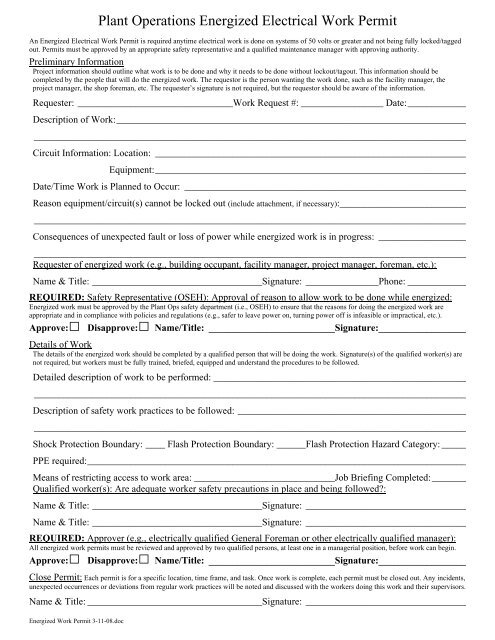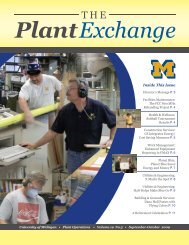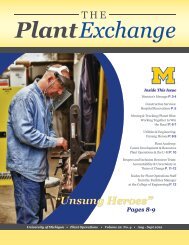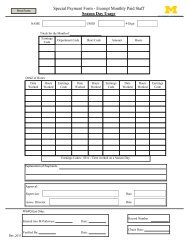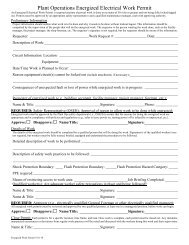Plant Operations Energized Electrical Work Permit
Plant Operations Energized Electrical Work Permit
Plant Operations Energized Electrical Work Permit
Create successful ePaper yourself
Turn your PDF publications into a flip-book with our unique Google optimized e-Paper software.
<strong>Energized</strong> <strong>Work</strong> <strong>Permit</strong> 3-11-08.doc<br />
<strong>Plant</strong> <strong>Operations</strong> <strong>Energized</strong> <strong>Electrical</strong> <strong>Work</strong> <strong>Permit</strong><br />
An <strong>Energized</strong> <strong>Electrical</strong> <strong>Work</strong> <strong>Permit</strong> is required anytime electrical work is done on systems of 50 volts or greater and not being fully locked/tagged<br />
out. <strong>Permit</strong>s must be approved by an appropriate safety representative and a qualified maintenance manager with approving authority.<br />
Preliminary Information<br />
Project information should outline what work is to be done and why it needs to be done without lockout/tagout. This information should be<br />
completed by the people that will do the energized work. The requestor is the person wanting the work done, such as the facility manager, the<br />
project manager, the shop foreman, etc. The requester’s signature is not required, but the requestor should be aware of the information.<br />
Requester: ________________________________<strong>Work</strong> Request #: _________________ Date: ____________<br />
Description of <strong>Work</strong>: ________________________________________________________________________<br />
_________________________________________________________________________________________<br />
Circuit Information: Location: ________________________________________________________________<br />
Equipment: ________________________________________________________________<br />
Date/Time <strong>Work</strong> is Planned to Occur: __________________________________________________________<br />
Reason equipment/circuit(s) cannot be locked out (include attachment, if necessary):__________________________<br />
_________________________________________________________________________________________<br />
Consequences of unexpected fault or loss of power while energized work is in progress: __________________<br />
_________________________________________________________________________________________<br />
Requester of energized work (e.g., building occupant, facility manager, project manager, foreman, etc.):<br />
Name & Title: ___________________________________Signature: _______________Phone: ____________<br />
REQUIRED: Safety Representative (OSEH): Approval of reason to allow work to be done while energized:<br />
<strong>Energized</strong> work must be approved by the <strong>Plant</strong> Ops safety department (i.e., OSEH) to ensure that the reasons for doing the energized work are<br />
appropriate and in compliance with policies and regulations (e.g., safer to leave power on, turning power off is infeasible or impractical, etc.).<br />
Approve:□ Disapprove:□ Name/Title: __________________________Signature:__________________<br />
Details of <strong>Work</strong><br />
The details of the energized work should be completed by a qualified person that will be doing the work. Signature(s) of the qualified worker(s) are<br />
not required, but workers must be fully trained, briefed, equipped and understand the procedures to be followed.<br />
Detailed description of work to be performed: ____________________________________________________<br />
_________________________________________________________________________________________<br />
Description of safety work practices to be followed: _______________________________________________<br />
_________________________________________________________________________________________<br />
Shock Protection Boundary: ____ Flash Protection Boundary: ______Flash Protection Hazard Category: _____<br />
PPE required: ______________________________________________________________________________<br />
Means of restricting access to work area: _____________________________Job Briefing Completed: _______<br />
Qualified worker(s): Are adequate worker safety precautions in place and being followed?:<br />
Name & Title: ___________________________________Signature: _________________________________<br />
Name & Title: ___________________________________Signature: _________________________________<br />
REQUIRED: Approver (e.g., electrically qualified General Foreman or other electrically qualified manager):<br />
All energized work permits must be reviewed and approved by two qualified persons, at least one in a managerial position, before work can begin.<br />
Approve:□ Disapprove:□ Name/Title: __________________________Signature:__________________<br />
Close <strong>Permit</strong>: Each permit is for a specific location, time frame, and task. Once work is complete, each permit must be closed out. Any incidents,<br />
unexpected occurrences or deviations from regular work practices will be noted and discussed with the workers doing this work and their supervisors.<br />
Name & Title: ____________________________________Signature: _________________________________
Approach Distance Boundaries<br />
Nominal System Limited Approach<br />
Voltage Range, Boundary:<br />
Phase to Phase Exposed Movable<br />
Conductor<br />
<strong>Plant</strong> <strong>Operations</strong> <strong>Energized</strong> <strong>Electrical</strong> <strong>Work</strong> <strong>Permit</strong><br />
Limited Approach<br />
Boundary:<br />
Exposed Fixed<br />
Circuit Part<br />
Restricted Approach<br />
Boundary; Includes<br />
Inadvertent<br />
Movement Adder<br />
Prohibited<br />
Approach<br />
Boundary<br />
50 to 300 V 10 ft 0 in. 3 ft 6 in. Avoid contact Avoid contact 4 ft 0 in.<br />
301 to 750 V 10 ft 0 in. 3 ft 6 in. 1 ft 0 in. 0 ft 1 in. 4 ft 0 in.<br />
751 V to 15 kV 10 ft 0 in. 5 ft 0 in. 2 ft 2 in. 0 ft 7 in. 4 ft 0 in.<br />
† assumes supply transformer sized at less than 300 kVA with over-current interrupting devices.<br />
Default Arc-Flash<br />
Protection Boundary<br />
(if no arc-flash<br />
analysis is available)†<br />
Arc-Flash Protection Levels:<br />
Arc Flash Protection Level Description of clothing components Min. Rating<br />
Level A: Basic work clothing for elect. qual. workers<br />
(equivalent to NFPA 70E 2004 hazard category 0)<br />
natural fiber long sleeve shirt; natural fiber long pants;<br />
natural fiber undergarments; safety glasses; and electric<br />
1.2 cal/cm 2<br />
Level B: Protection for electrically qualified workers*<br />
(equivalent to NFPA 70E 2004 hazard category 2)<br />
Level C: Protection for electrically qualified workers<br />
(equivalent to NFPA 70E 2004 hazard category 4)<br />
hazard rated safety shoes<br />
basic work clothing (Level A) plus: fire resistant coveralls<br />
rated to at least 8 cal/cm 2 ; voltage rated gloves; hard hat*;<br />
arc-flash rated face shield*; and hearing protection*<br />
basic work clothing (Level A) plus: fire resistant coveralls<br />
w/ double layer switching hood rated to at least 40 cal/cm 2<br />
(i.e., a complete arc flash suit); and hearing protection<br />
* some tasks that require Level B Protection do not require an arc-flash rated face shield, hard hat and hearing protection.<br />
8 cal/cm 2<br />
40 cal/cm 2<br />
Example tasks with acceptable PPE requirements (for more information contact your foreman or OSEH):<br />
Task (Assumes Equipment Is <strong>Energized</strong>, and <strong>Work</strong> Is Done Within the Flash Protection<br />
Boundary)<br />
Flash<br />
Protection<br />
V-rated<br />
Gloves<br />
V-rated<br />
Tools<br />
Panelboards Rated 240 V and Below — Note 1 and Note 3<br />
Circuit breaker (CB) or fused switch operation with covers on A No No<br />
CB or fused switch operation with covers off A No No<br />
<strong>Work</strong> on energized parts, including voltage testing B# Yes Yes<br />
Remove/install CBs or fused switches B# Yes Yes<br />
Removal of bolted covers (to expose bare, energized parts) B# No No<br />
Opening hinged covers (to expose bare, energized parts) A No No<br />
Panelboards or Switchboards Rated >240 V and up to 600 V (with molded case or insulated<br />
case circuit breakers) — Note 1 and Note 3<br />
CB or fused switch operation with covers on A No No<br />
CB or fused switch operation with covers off B# No No<br />
<strong>Work</strong> on energized parts, including voltage testing B Yes Yes<br />
600 V Class Motor Control Centers (MCCs) — Note 2 (except as indicated) and Note 3<br />
CB or fused switch or starter operation with enclosure doors closed A No No<br />
Reading a panel meter while operating a meter switch A No No<br />
CB or fused switch or starter operation with enclosure doors open B# No No<br />
<strong>Work</strong> on energized parts, including voltage testing B Yes Yes<br />
<strong>Work</strong> on control circuits with energized parts 120 V or below, exposed A Yes Yes<br />
<strong>Work</strong> on control circuits with energized parts >120 V, exposed B Yes Yes<br />
Insertion or removal of individual starter “buckets” from MCC — Note 4 C Yes No<br />
Application of safety grounds, after voltage test B Yes No<br />
Removal of bolted covers (to expose bare, energized parts) B No No<br />
Opening hinged covers (to expose bare, energized parts) B# No No<br />
Other 600 V Class (277 V through 600 V, nominal) Equipment — Note 3<br />
Lighting or small power transformers (600 V, maximum) — — —<br />
Removal of bolted covers (to expose bare, energized parts) B No No<br />
Opening hinged covers (to expose bare, energized parts) B# No No<br />
<strong>Work</strong> on energized parts, including voltage testing B Yes Yes<br />
Application of safety grounds, after voltage test B Yes No<br />
B# means that an arc-flash rated face shield, hard hat & hearing protection are not required for this task. Other Level B protection is required<br />
Notes: 1. 25 kA short circuit current available, 0.03 second (2 cycle) fault clearing time. 2. 65 kA short circuit current available, 0.03 seconds (2<br />
cycles) fault clearing time. 3. For < 10 kA short circuit current available, the hazard/risk category required may be reduced by one number.<br />
4. 65 kA short circuit current available, 0.33 second (20 cycle) fault clearing time.<br />
<strong>Energized</strong> <strong>Work</strong> <strong>Permit</strong> 3-11-08.doc


